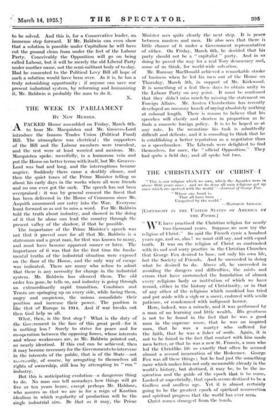THE WEEK IN PARLIAMENT
BY NEW MEMBER.
APACKED House assembled on Friday, March 6th, to hear Mr. Macquisten and Mr. Greaves-Lord introduce the famous Trades Union (Political Fund) Bill. The atmosphere was electrical ; the supporters of the Bill and the Labour members were truculent, and *the- rest were at least worried and anxious. Mr. Macquisten spoke; mercifully, in a humorous vein and put the HOuse on better terms with itself, but Mr. Greaves- Lord was bad and long, and the interruptions became angrier. -Suddenly there came a deathly silence, and then the quiet tones of the Prime Minister telling us about his early days in the works where all were friends and no one ever got the sack. The speech has not been overpraised it was by general consent the finest that has been delivered in the House of Commons since Mr. Asquith. announced our entry into the, War. Everyone APACKED House assembled on Friday, March 6th, to hear Mr. Macquisten and Mr. Greaves-Lord introduce the famous Trades Union (Political Fund) Bill. The atmosphere was electrical ; the supporters of the Bill and the Labour members were truculent, and *the- rest were at least worried and anxious. Mr. Macquisten spoke; mercifully, in a humorous vein and put the HOuse on better terms with itself, but Mr. Greaves- Lord was bad and long, and the interruptions became angrier. -Suddenly there came a deathly silence, and then the quiet tones of the Prime Minister telling us about his early days in the works where all were friends and no one ever got the sack. The speech has not been overpraised it was by general consent the finest that has been delivered in the House of Commons since Mr. Asquith. announced our entry into the, War. Everyone . leant forward so as not to miss a word. For Mr. Baldwin told the truth about industry, and showed in the doing of it that he alone can lead the country through the present* valley of the shadow, if that be possible.
The importance of the Prime Minister's speech was not 'that it proved' once for all that Mr. Baldwin is a statesman and a great man, for that was known to many, and must have become apparent sooner or later. The importance of it was that for the first time the funda- mental truths of the industrial situation were exposed on the floor of the House, and the only way of escape was' indicated. There are many who refuse to admit that there is any necessity for change in the industrial system. Mr. Baldwin has silenced them. The old order has gone, he tells us, and industry is going through an extraordinarily rapid transition. Combines and Trusts arc springing upon every side, while facing them, angry and 'suspicious, the unions consolidate their position and increase their power. The position is like that of Europe iii 1914. 'And if war breaks out then God help us all: What,. then, is : the 'first step ? • What , is the duty of . the Governnient in the face of this great peril=for it is-.nothing less Surely to strive for peace and for . co-operation between the opposing forces, whose, interests . and whose. weaknesses are, as Mr. Baldwin .pointed out, . • so' nearly. identical. -If this end can be achieved; th-en :it may become necessary.for the Governments.t0 intervene in the interests 'of the public, that is of the State—not lactes-s.trily, of. 'course, by. arrogating to themSelves• all rights- of ownership, still • less by attempting to " run " industry. '
But .this is anticipating evolution—a dangerous thing to do. No man can tell nowadays how things will go five or ten years hence, except perhaps Mr. Haldane, who assures us that we are in for a reign of Kantian idealism -in which regularity of production will be the single industrial aim. Be that as it may, the Prime Minister sees quite clearly the next step. It is peace between masters and men. He also sees that there is little chance of it under a Government representative of either. On Friday, March 6th, he decided that his party should not be a " capitalist " party. And in so doing he paved the way for a real Tory democracy and, some of us think, for world-wide salvation. • Mr. Ramsay MacDonald achieved a remarkable stroke of business when he led his men out of the House on Thursday, March 5th, in support of Mr. Kirkwood. It is something of a feat these days to obtain unity in the Labour Party on any point. It must be confessed that they didn't miss much by missing the statement on Foreign Affairs. Mr. Austen Chamberlain has recently developed an uncanny knack of saying absolutely nothing at colossal length. There is reason to believe that his speeches will clarify and shorten in proportion as he finds a concrete foreign policy. It is to be hoped so at any rate. In the meantime his task is admittedly difficult and delicate, and it is consoling to think that he is establishing a better reputation as a negotiator than as a speechmaker. The Liberals were delighted to find themselves, for once, the " official Opposition." They had quite a field day, and all spoke but two.














































 Previous page
Previous page